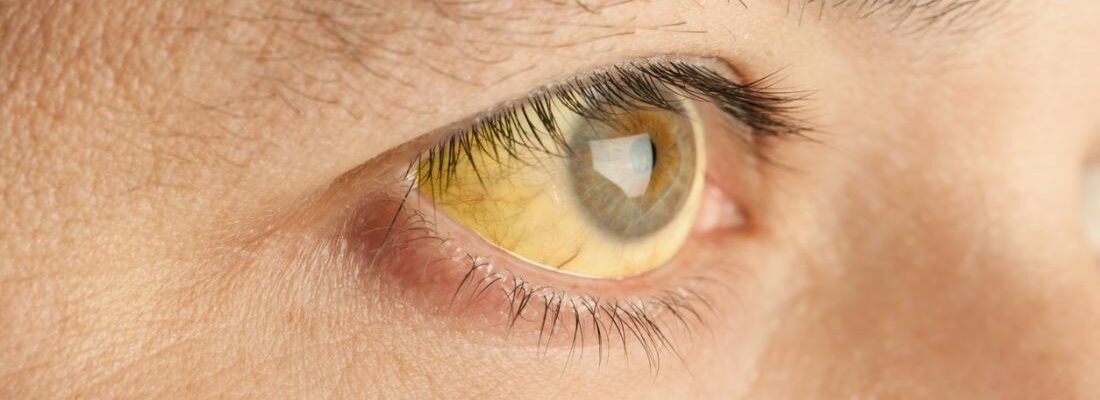Summary
Gilbert syndrome is a hereditary genetic disorder that results in elevated levels of bilirubin in the body. Bilirubin is a waste product formed from the natural breakdown of red blood cells. In Gilbert syndrome, the liver processes bilirubin more slowly than normal, causing a mild buildup in the bloodstream. When bilirubin accumulates, it can lead to jaundice, or yellowing of the skin and eyes.
However, Gilbert syndrome is generally a harmless condition and doesn’t pose any serious health risks. Most cases do not require treatment because the bilirubin levels are not dangerously high. Jaundice typically only occurs when triggered by factors like stress, exercise, menstruation, alcohol consumption, or fasting.
Most individuals with Gilbert syndrome do not experience any symptoms. If symptoms do occur, they are usually mild and include slight yellowing of the skin or eyes, nausea, abdominal pain, diarrhea, and fatigue. These symptoms often resolve on their own and can be managed with simple lifestyle adjustments, such as getting enough rest.
Table of Contents
Symptoms of Gilbert Syndrome

People with Gilbert syndrome typically do not experience noticeable symptoms. However, when symptoms do occur, they are usually mild and may include the following:
- Mild yellowing of the skin and eyes (jaundice). This is the most common symptom caused by elevated bilirubin levels.
- Nausea. Some individuals may feel queasy or experience an upset stomach.
- Abdominal pain. Mild pain or discomfort may occur in the stomach area.
- Bloating. Swelling or a feeling of fullness in the abdomen is possible.
- Diarrhea. Some may experience loose stools, though others could have the opposite problem.
- Constipation. Difficulty passing stools is also a potential symptom.
- Fatigue. Quick onset of tiredness or exhaustion without significant exertion.
- Loss of appetite. A reduced desire to eat can occur.
- Flu-like symptoms. Feelings of weakness, similar to the onset of illness or fever.
- Dizziness. A feeling of lightheadedness may be experienced.
- Confusion. Some individuals might feel mentally foggy or disoriented.
Even when a person is diagnosed with Gilbert syndrome, these symptoms are not constant. They may only appear when triggered by factors such as stress, intense exercise, fasting, dehydration, lack of sleep, infections, alcohol consumption, menstruation, cold exposure, or illness. While these symptoms can be bothersome, they are usually mild and temporary.
Diagnostic Procedures for Gilbert Syndrome
Diagnosing Gilbert syndrome typically involves a series of tests to rule out other liver or blood conditions that might cause similar symptoms, such as jaundice or elevated bilirubin levels. Since Gilbert syndrome is generally harmless and does not lead to serious liver dysfunction, its diagnosis focuses on confirming mildly elevated bilirubin levels without other underlying liver issues. Here are the main diagnostic procedures used:
- Blood Tests.
- Bilirubin Test. The primary diagnostic tool for Gilbert syndrome is a blood test to measure bilirubin levels. Individuals with Gilbert syndrome will often have slightly elevated levels of unconjugated (indirect) bilirubin, especially during periods of fasting, stress, or illness.
- Liver Function Tests (LFTs). These tests measure enzymes and proteins that indicate how well the liver is functioning. In Gilbert syndrome, liver function tests are usually normal despite elevated bilirubin levels, helping to rule out other liver diseases.
- Complete Blood Count (CBC). A CBC helps evaluate the overall health of the blood and can rule out other conditions, such as hemolytic anemia, that may also cause jaundice and elevated bilirubin.
- Genetic Testing. While not always necessary, genetic testing can confirm the presence of the UGT1A1 gene mutation responsible for Gilbert syndrome. This test is used in cases where a clear diagnosis cannot be made through blood tests alone or to provide definitive confirmation.
- Other Diagnostic Imaging (if needed). In rare cases where jaundice is more pronounced, doctors may use imaging tests like ultrasound or CT scans to examine the liver and bile ducts, ensuring there are no structural issues contributing to the bilirubin buildup. However, these tests are generally not required for diagnosing Gilbert syndrome.
Since Gilbert syndrome does not typically cause significant liver dysfunction, a diagnosis is often made through routine blood tests and clinical history. Once diagnosed, no specific treatment is usually necessary, as the condition is benign and does not lead to long-term liver damage.
Complications of Untreated Gilbert Syndrome
Fortunately, Gilbert syndrome is a benign condition and does not typically lead to serious health complications, even if left untreated. The syndrome itself is generally harmless, and most individuals live normal, healthy lives without the need for medical intervention. However, there are some factors to be aware of:
- Jaundice Episodes. While Gilbert syndrome doesn’t cause long-term damage to the liver, individuals may experience occasional episodes of jaundice (yellowing of the skin and eyes), especially during times of stress, fasting, illness, or dehydration. These episodes are usually mild and temporary but may be bothersome for some individuals.
- Drug Sensitivity. People with Gilbert syndrome may have increased sensitivity to certain medications. The liver enzyme (bilirubin-UGT) that is deficient in individuals with Gilbert syndrome also helps metabolize certain drugs. As a result, medications like irinotecan (used in chemotherapy) or indinavir (used for HIV treatment) may not be processed efficiently by the liver, potentially leading to higher concentrations of the drug in the bloodstream and an increased risk of side effects.
- Misdiagnosis and Unnecessary Tests. Because Gilbert syndrome can cause mild jaundice, it may be confused with more serious liver conditions, leading to unnecessary diagnostic tests or concern. This is why accurate diagnosis through blood tests is important to differentiate Gilbert syndrome from other liver diseases.
- Impact on Quality of Life. Although complications are rare, some individuals may experience minor symptoms such as fatigue, nausea, or abdominal discomfort, especially during jaundice episodes. These symptoms are usually mild and temporary but may affect a person’s quality of life during flare-ups.
Overall, Gilbert syndrome does not cause major health issues, and most individuals require little to no medical treatment. Being aware of triggers like stress, illness, and certain medications can help manage symptoms and avoid unnecessary complications.
Causes of Gilbert Syndrome
Gilbert syndrome is caused by an inherited genetic mutation passed from one or both parents. The disorder occurs due to a mutation in the UGT1A1 gene, which plays a crucial role in processing bilirubin. This gene is responsible for producing an enzyme known as bilirubin-UGT, which helps break down bilirubin—a waste product formed from the breakdown of red blood cells—so it can be excreted from the body.
In individuals with Gilbert syndrome, the mutation in the UGT1A1 gene leads to reduced production of the bilirubin-UGT enzyme. As a result, the liver cannot efficiently process bilirubin, causing it to build up in the bloodstream and tissues. This accumulation leads to occasional episodes of jaundice (yellowing of the skin and eyes), particularly when triggered by factors like stress, fasting, or illness.
While Gilbert syndrome is a genetic condition, it typically remains mild and does not significantly affect the liver’s overall function. The buildup of bilirubin is not harmful in most cases, and the condition is usually managed with simple lifestyle adjustments.
Prevention of Gilbert Syndrome
Since Gilbert syndrome is a genetic disorder, it cannot be prevented. The condition is inherited when an individual receives the altered gene from one or both parents. This means that if the parents carry the defective UGT1A1 gene, there is a possibility it can be passed on to their children.
Although Gilbert syndrome itself cannot be avoided, managing the condition and minimizing its symptoms is possible. By identifying the triggers that can elevate bilirubin levels, such as stress, fasting, dehydration, or alcohol consumption, individuals with Gilbert syndrome can take proactive steps to reduce the likelihood of experiencing symptoms like jaundice. Living a balanced lifestyle, staying hydrated, avoiding excessive alcohol, and managing stress can help manage the condition effectively. However, it’s important to note that Gilbert syndrome is generally harmless and does not typically lead to serious health complications.
Risk Factors for Gilbert Syndrome

The likelihood of developing Gilbert syndrome can increase due to the following factors:
- Family history of Gilbert syndrome. If there is a history of Gilbert syndrome in your family, you are at a higher risk of inheriting the condition. The genetic mutation responsible for the disorder can be passed down from parents to their children, leading to elevated bilirubin levels in the body.
- Being male. Data shows that Gilbert syndrome is more commonly diagnosed in men than in women, although the exact reason for this gender difference is not fully understood.
Aside from these two factors, there are no other significant risk factors that increase the likelihood of developing Gilbert syndrome. Additionally, lifestyle factors like excessive alcohol consumption, environmental exposures, or other liver diseases are not directly linked to the development of this condition. While the syndrome is inherited, it remains largely benign and manageable.
Gilbert Syndrome FAQs
Here are some frequently asked questions about Gilbert syndrome to help better understand the condition:
- What is Gilbert syndrome?
Gilbert syndrome is a genetic liver disorder that results in mildly elevated levels of bilirubin in the blood. This happens because the liver enzyme responsible for breaking down bilirubin (bilirubin-UGT) is not produced in sufficient amounts. It’s generally harmless and often doesn’t cause significant symptoms. - What causes Gilbert syndrome?
Gilbert syndrome is caused by a mutation in the UGT1A1 gene, which is inherited from one or both parents. The gene mutation reduces the liver’s ability to process bilirubin efficiently, leading to occasional mild jaundice (yellowing of the skin and eyes). - What are the symptoms of Gilbert syndrome?
Most people with Gilbert syndrome experience no symptoms. However, some may have mild episodes of jaundice, particularly during periods of stress, fasting, dehydration, illness, or physical exertion. Other possible symptoms include fatigue, nausea, and mild abdominal discomfort. - Is Gilbert syndrome dangerous?
No, Gilbert syndrome is not dangerous. It does not lead to serious health problems or liver damage. Most individuals with Gilbert syndrome live normal, healthy lives without needing treatment. - How is Gilbert syndrome diagnosed?
Gilbert syndrome is usually diagnosed through blood tests that measure bilirubin levels and assess liver function. Genetic testing can also confirm the presence of the UGT1A1 gene mutation, but it’s typically not necessary unless there’s uncertainty about the diagnosis. - Can Gilbert syndrome be treated?
Gilbert syndrome does not usually require treatment because it is generally harmless. Managing triggers, such as reducing stress and avoiding fasting or dehydration, can help minimize symptoms. For those who experience more frequent symptoms, supportive measures like rest can help. - Can Gilbert syndrome cause complications?
While Gilbert syndrome itself doesn’t cause complications, people with this condition may be more sensitive to certain medications, such as irinotecan (a chemotherapy drug) or indinavir (an HIV medication). It’s important to inform healthcare providers of your condition if you require these treatments. - Is Gilbert syndrome hereditary?
Yes, Gilbert syndrome is an inherited condition. It is passed down when one or both parents carry the mutated UGT1A1 gene. The disorder is more likely to occur if both parents have the gene mutation. - Does Gilbert syndrome affect life expectancy?
No, Gilbert syndrome does not affect life expectancy. It is a benign condition that does not lead to serious liver problems or other health complications. - Can Gilbert syndrome be prevented?
Since Gilbert syndrome is a genetic condition, it cannot be prevented. However, managing lifestyle factors such as avoiding stress, staying hydrated, and eating regular meals can help reduce the likelihood of triggering symptoms.


